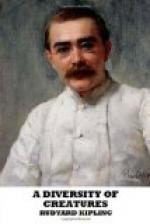The Soldier may forget
his sword
The Sailorman
the sea,
The Mason may forget
the Word
And the
Priest his litany:
The maid may forget
both jewel and gem,
And the
bride her wedding-dress—
But the Jew shall forget
Jerusalem
Ere we forget
the Press!
Who once hath stood
through the loaded hour
Ere, roaring
like the gale,
The Harrild and the
Hoe devour
Their league-long
paper bale,
And has lit his pipe
in the morning calm
That follows
the midnight stress—
He hath sold his heart
to the old Black Art
We call
the daily Press.
Who once hath dealt
in the widest game
That all
of a man can play,
No later love, no larger
fame
Will lure
him long away.
As the war-horse smelleth
the battle afar,
The entered
Soul, no less,
He saith: ‘Ha!
Ha!’ where the trumpets are
And the
thunders of the Press.
Canst thou number the
days that we fulfil,
Or the Times
that we bring forth?
Canst thou send the
lightnings to do thy will,
And cause
them reign on earth?
Hast thou given a peacock
goodly wings
To please
his foolishness?
Sit down at the heart
of men and things,
Companion
of the Press!
The Pope may launch
his Interdict,
The Union
its decree,
But the bubble is blown
and the bubble is pricked
By Us and
such as We.
Remember the battle
and stand aside
While Thrones
and Powers confess
That King over all the
children of pride
Is the Press—the
Press—the Press!
In The Presence
(1912)
‘So the matter,’ the Regimental Chaplain concluded, ’was correct; in every way correct. I am well pleased with Rutton Singh and Attar Singh. They have gathered the fruit of their lives.’
He folded his arms and sat down on the verandah. The hot day had ended, and there was a pleasant smell of cooking along the regimental lines, where half-clad men went back and forth with leaf platters and water-goglets. The Subadar-Major, in extreme undress, sat on a chair, as befitted his rank; the Havildar-Major, his nephew, leaning respectfully against the wall. The Regiment was at home and at ease in its own quarters in its own district which takes its name from the great Muhammadan saint Mian Mir, revered by Jehangir and beloved by Guru Har Gobind, sixth of the great Sikh Gurus.
‘Quite correct,’ the Regimental Chaplain repeated.
No Sikh contradicts his Regimental Chaplain who expounds to him the Holy Book of the Grunth Sahib and who knows the lives and legends of all the Gurus.
The Subadar-Major bowed his grey head. The Havildar-Major coughed respectfully to attract attention and to ask leave to speak. Though he was the Subadar-Major’s nephew, and though his father held twice as much land as his uncle, he knew his place in the scheme of things. The Subadar-Major shifted one hand with an iron bracelet on the wrist.




